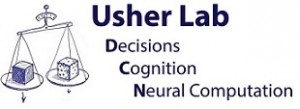Visual search, Executive control, Memory and Emotion
We have developed a detailed computational theory that accounts for how people allocate attention across a display, when they search for an object among distractors. This model, assumes both a parallel and a serial stage and it provides a quantitative account for response-time distributions in visual-search, which we are now comparing with that obtained in models that assume only parallel processing of items in the display (Moran R.,Zehetleitner M, M¨uller H & Usher M. (2013). Competitive guided search:Meeting the challenge of benchmark RT distributions. Journal of Vision (2013) 13(8), 1–31).
In addition, we have been examining the mechanism that allocates attention to tasks (rather than across space), using the Stroop-task. Here we have developed a computational model that accounts for how pro-active control and dual task interference affect two types of conflict that one experiences in this task: information vs. task conflict. (Kalanthroff E, Avnit A & Henik A, Davelaar EJ & Usher M. (2014). Stroop proactive control and task conflict are modulated by concurrent working memory load. Psychon Bull Rev (PDF: PBR2014). At present we are developing a combined model that uses attentional mechanisms to account for a variety of attentional biases.
Memory
We are interested in the frontal-cortex mechanism that the brain uses to encode relations between memory items in memory. A recent paper on this is: Elhalal A, Davelaar EJ & Usher M (2014). The role of the PFC in memory: An investigation of the Von Restorff effect, Frontiers in Human Neuroscience, vol 8. More recent work by Gil Suzin shows...
Emotion and Cognition
How do irrelevant emotional signals impact of cognitive control? Imagine taking a penalty in football, while the hostile surrounding crowd tries to intimidate you. Can one filter out such emotional distractors. If one does this too well, will we still be sensitive to critical information for our survival (e.g., the call "fire"!)? In a number of recent studies we have examined the interaction between emotional primes and attentional control in the Stroop task. An MA thesis by Zeev Mogilevsky, "The impact of prior emotional stimuli on executive control" is addressing this issue (Abstract).
